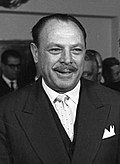Pashtunistan
Pashtunistan (Pashto: پښتونستان, Pax̌tūnistān or Pukhtunistan,[1][2][3] meaning the "land of Pashtuns"[4]) means the region where the indigenous Pashtun people of modern-day Afghanistan and Pakistan lived.[5][6]
Pashtunistan Media
- Pashtuns.jpg
Pashtun children, indigenous to the Pashtunistan region
- Afghanistan region during 500 BC.jpg
The area during 500 B.C. was recorded as Arachosia and inhabited by a people called the Pactyans.
- Coronation of Ahmad Shah Durrani in 1747 by Breshna.jpg
Coronation of Ahmad Shah Durrani in 1747 by a 20th-century Afghan artist, Abdul Ghafoor Breshna.
- King Amanullah Khan.jpg
King Amanullah Khan, son of Habibullah Khan and grandson of Abdur Rahman Khan.
- Gandhi and Abdul Gaffa Khan.jpg
Bacha Khan (left) with Mahatma Gandhi and Kasturba Gandhi
Ayub Khan, President of Pakistan from 1958 to 1969, belonged to the Pashtun Tareen tribe of Haripur and fought against Pashtun rebellions for the British Crown
- Afghanistan Land Claims.png
Afghanistan's territorial claims against Pakistan
- Mulkanah Village-2012.jpg
A village in Kunar Province of Afghanistan
- Khogyani district.jpg
Nangarhar Province, Afghanistan
References
- ↑ Students' Britannica India. Vol. 1–5. Encyclopædia Britannica. 2000. ISBN 9780852297605. Retrieved 2009-06-07.
Ghaffar Khan, who opposed the partition, chose to live in Pakistan, where he continued to fight for the rights of the Pashtun minority and for an autonomous Pakhtunistan (or Pathanistan) within Pakistan.
- ↑ The Modern Review, Volume 86. Prabasi Press Private. 1949. Retrieved 2009-06-07.
The Afghan Government is actively sympathetic towards their demand for a Pathanistan. It has been declared by the Afghan Parliament that Afghanistan does not recognise the Durand line...
- ↑ The Spectator, Volume 184. F.C. Westley. 1950. Retrieved 2009-06-07.
Instead it adopted the programme of an independent " Pathanistan " — a programme calculated to strike at the very roots of the new Dominion. More recently the Pathanistan idea has been taken up by Afghanistan.
- ↑ Various spellings result from different pronunciation in various Pashto dialects. See Pashto language: Dialects for further information.
- ↑ Nath, Samir (2002). Dictionary of Vedanta. Sarup & Sons. p. 273. ISBN 81-7890-056-4. Retrieved 2010-09-10.
- ↑ Houtsma, Martijn Theodoor (1987). E.J. Brill's first encyclopaedia of Islam, 1913-1936. Vol. 2. BRILL. p. 150. ISBN 90-04-08265-4. Retrieved 2010-09-24.
